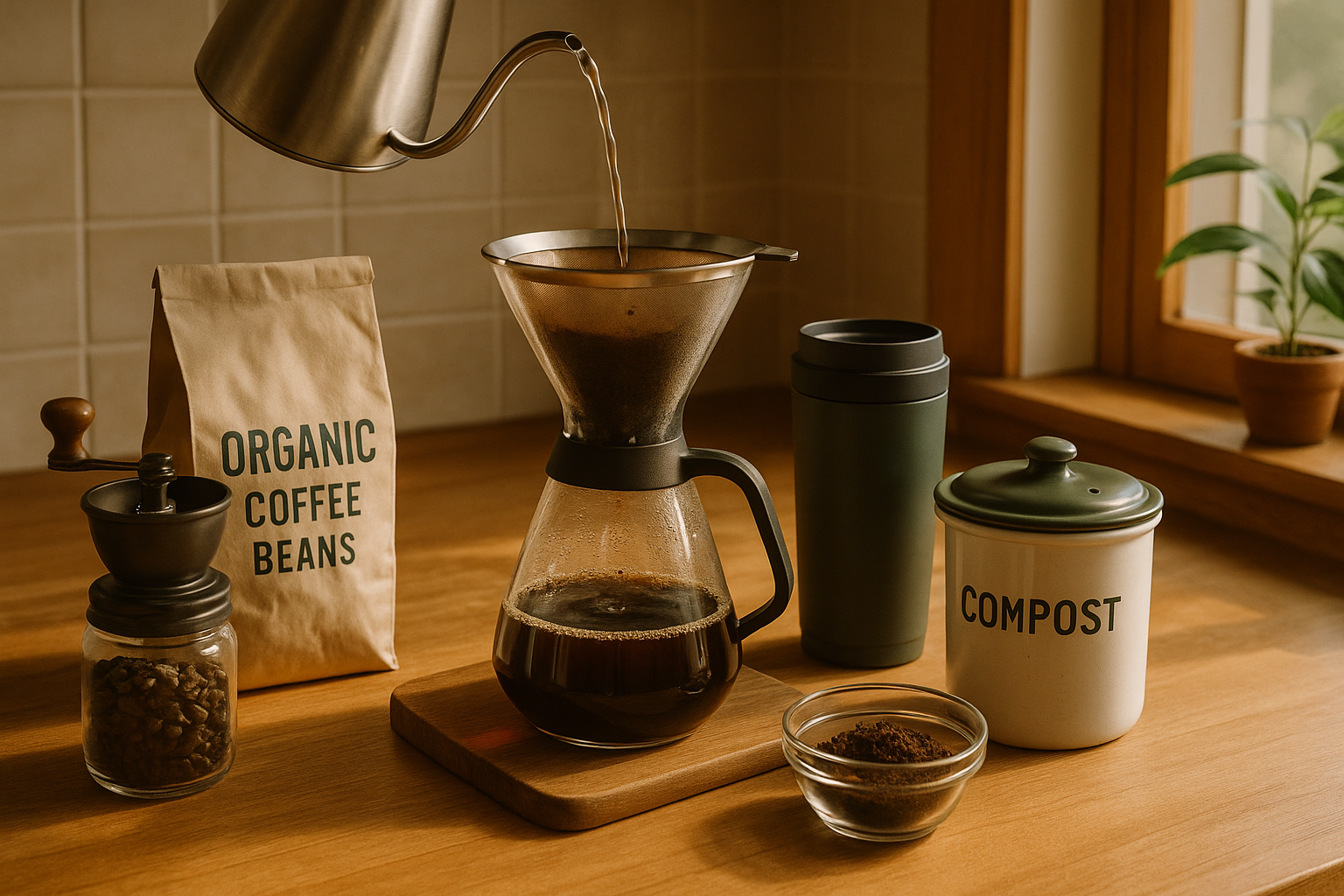Drinking coffee is a daily ritual for millions of people, but most coffee lovers rarely consider the environmental consequences of their favorite brew.
From how coffee is grown to the way it’s brewed and disposed of, every step of the process impacts the planet. The good news?
There are several easy, meaningful ways to make your coffee habits more sustainable—without sacrificing flavor or comfort. Here are seven smart and impactful changes you can make starting today.
1. Choose Certified Sustainable Coffee
The most powerful choice you can make as a consumer is selecting coffee that comes from verified sustainable sources. Look for certifications such as:
- USDA Organic: Indicates the coffee is grown without synthetic chemicals and supports soil and water conservation.
- Fair Trade Certified: Ensures fair wages and better working conditions for farmers.
- Rainforest Alliance: Focuses on ecosystem preservation and responsible farming.
- Bird-Friendly: A rigorous certification by the Smithsonian that promotes shade-grown coffee in forested habitats.
These labels don’t just guarantee better agricultural practices—they support entire communities and ecosystems. They also encourage large corporations to invest in ethical sourcing as consumer demand shifts.
2. Brew at Home More Often
While visiting your favorite café is a comforting routine, brewing your own coffee at home is one of the most sustainable changes you can make. Commercial coffee shops generate high volumes of single-use cups, plastic lids, and straws—much of which ends up in landfills or oceans.
Home brewing allows you to control every aspect of your coffee preparation:
- Choose reusable filters instead of paper ones.
- Use an energy-efficient brewing method like a French press or Aeropress.
- Avoid over-brewing and wasting excess coffee.
Not only will you significantly reduce waste, but you’ll also save money over time—another sustainability bonus.
3. Invest in Reusable Coffee Gear
The coffee industry is filled with disposable products: paper cups, plastic lids, stirrers, K-Cups, and even aluminum espresso pods. Switching to reusable gear can dramatically reduce your environmental impact.
Start with these basics:
- Reusable travel mug: Brands like KeepCup and Klean Kanteen offer durable, insulated cups.
- Stainless steel or glass straws: Ditch the plastic for something long-lasting.
- Metal mesh filter: Works well for pour-over methods and eliminates the need for disposable filters.
- Refillable pods: If you use a single-serve machine, invest in refillable pods that you can use with your own ground coffee.
These changes may seem small, but they make a big difference over time, especially if adopted by millions of coffee drinkers.
4. Be Mindful About Water Usage
Making coffee requires water—not just for brewing, but for washing equipment and growing the beans. In regions already facing water scarcity, coffee farming can intensify the problem.
Here’s how to reduce your personal water footprint:
- Only boil the amount of water you need. Don’t fill the kettle to the top if you’re making one cup.
- Use a drip tray or a clean bowl to collect unused water and reuse it for plants.
- Wash your coffee gear efficiently by using minimal water and natural soap.
If you’re buying coffee beans, look into how the brand manages water usage during production. Some farms recycle water or use eco-friendly processing methods that reduce waste.
5. Support Local Roasters and Coffee Shops
Buying local is one of the easiest ways to reduce your carbon footprint. When you purchase coffee roasted nearby, you minimize the emissions related to transportation and packaging.
Local roasters also often source their beans directly from small, ethical farms. This direct trade model cuts out exploitative middlemen and gives more profit back to the growers.
Many independent cafés and roasters are also pioneers in sustainability—offering composting, zero-waste packaging, and community education. Supporting these businesses not only helps the planet but also strengthens your local economy.
6. Repurpose Your Coffee Grounds
Used coffee grounds may seem like garbage, but they’re surprisingly versatile. Instead of tossing them in the trash, try one of these eco-friendly ways to reuse them:
- Composting: Coffee grounds are rich in nitrogen, making them ideal for composting. Just mix them with other green and brown materials in your compost pile.
- Fertilizer: Sprinkle them directly into garden soil for a nutrient boost.
- Natural deodorizer: Place dried grounds in the fridge or trash bin to absorb odors.
- Skin exfoliant: Mix with coconut oil and sugar for a homemade body scrub.
By repurposing coffee waste, you reduce landfill load and maximize the value of every cup.
7. Buy Coffee in Bulk with Minimal Packaging
Most coffee packaging is a mix of plastic and foil, which makes it non-recyclable. To cut down on waste, buy your coffee in bulk from a local shop or roaster that offers minimal or compostable packaging.
Better yet, bring your own container. Many shops offer discounts when you bring a reusable jar, tin, or cloth bag. When that’s not possible, look for brands using:
- Compostable bags made from plant-based materials
- Recyclable cardboard or paper tubes
- Refill programs that accept empty containers for reuse
In a world overwhelmed by packaging waste, even your coffee bag can be part of the solution.
Going Further: Bonus Tips for the Truly Committed
If you’re ready to take your sustainable coffee journey to the next level, consider the following advanced actions:
- Grow your own coffee plant: It may not produce enough for daily consumption, but it can be a fun and educational experience.
- Host a sustainable coffee workshop: Help your community understand the importance of ethical coffee habits.
- Write to your favorite brands: Ask them to switch to compostable pods, improve their sourcing, or share more about their sustainability goals.
The more people engage with sustainability, the more likely it is that large-scale systems will evolve for the better.
Why It Matters: The Global Impact of Your Coffee
The average coffee drinker might not think of themselves as an environmental influencer, but collectively, we have massive power. The global coffee industry is valued at over $100 billion—and that money drives the decisions of farmers, corporations, and governments.
When consumers demand sustainability, companies have to adapt. Your choices shape:
- How coffee is farmed and processed
- How workers are treated and paid
- How the environment is protected—or exploited
It’s not about perfection. It’s about progress. Every small decision, when repeated daily, builds momentum for change.
Final Words: Conscious Sipping for a Better Tomorrow
Your morning coffee can either harm or heal the planet—it all depends on how you approach it. Making sustainable choices doesn’t mean giving up the flavors, rituals, or enjoyment of coffee. In fact, it can deepen your appreciation for the drink and its journey from bean to cup.
When you opt for sustainable options, you support the farmers who care for the land, reduce your personal waste, and invest in a better future for our ecosystems. So the next time you brew, sip with intention—and know that you’re doing more than fueling your day. You’re helping fuel a movement.

